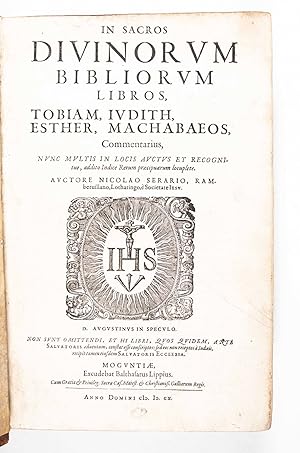Beschreibung
Sammelband of two works, published in 1555 and 1610, folio. Contemporary calf, elaborate gilt vignettes at both covers; spine with raised bands and gilt-tooled compartments, a.e.g. In a handsome, very well-preserved contemporary gilt-tooled binding. 1. In Sacros Divinorum Libros, Mainz: Balthasar Lipp, 1610. (?)3, A-2Y6 (= 273 leaves: blank 2Y6; F2 mis-signed F3). [6], 531, [6, indices], [3, blank]pp. Large woodcut printer's device at title; woodcut ornaments and lettrines. Biblical texts in two columns; each work with separate dedication and index. Greek passages throughout, with a few Hebrew words and phrases in two fonts, the larger modelled on traditional manuscripts, the smaller a neat square style. 2. In Proverbia Salomonis, Paris: Michel de Vascosan, 1555. [pi]2 A-Z6, Aa3 (= 143 leaves). [2], 141ff. Occasional passages in Greek and Hebrew. Printed marginalia. Educated at Cambridge, Ralph Baynes (ca.1504-1560) was bishop of Lichfield and Coventry and, for a short time, Profesor Hebrew in the University of Paris. All of his books were published in France. After his return to England in 1554 he "became one of the chief restorers of Hebrew Learning in England" (Smitskamp). "His Prima rudimenta in linguam Hebraem (1550) was the first Hebrew grammar published by an Englishman, his Compendium Michlol (1554) an influential edition of the medieval exposition of Hebrew grammar by David Kimchi. His commentary on the Hebrew text of the book of Proverbs, In Proverbia Salomonis tres libri (1555), was later included in the 1660 collection Critici sacri, edited by John Pearson and others. Under Henry VIII, Baynes had been an outspoken critic of the reformist preaching of Hugh Latimer, and during Mary's reign he was involved in the examination of protestants, including John Hooper, Robert Glover, John Philpot, and Joan Waste, all of whom suffered at the stake. Following the accession of Elizabeth he voted consistently against the new religious legislation and took part, as part of the Roman Catholic contingent, in the abortive Westminster conference of 1559. He was adamant that there was no real hope of settling the theological controversies dividing Catholics from protestants, not least because of their differing views on the relative authority of scripture and tradition. He was deprived on 26 June that year and subsequently imprisoned in Edmund Grindal's house in London. He died there, reportedly of the stone, on 18 November 1559 and was buried in St Dunstan-in-the-West, London, on 24 November.â (ODNB online). Richard Simon (1638-1712), who is generally quite critical and ascerbic in his assessments of his fellow Christian hebraists, deals kindly with Baynes' edition of Proverbs: "[T]his Author who was an Englishman, and the Kingâ s Hebrew Professor at Paris, enlarges upon the Literal Sence. He sometimes follows the Jewish Interpreters, and his chief Author is Aben Esra, whom he often quotes, although there is not much Jewish Learning in his Work. To conclude, he Explains his Text very clearly, and always joyns with the Vulgar another Translation made from the Hebrew.â Adams B-1544. Schwarzfuchs (Paris) 236: Hà breu passim. Caractà res de Ch. Estienne. à pitre dà dicatoire du commentateur au roi Henri II. Pour chaque verset, Vulgate, variante dâ aprà s lâ hà breu et commentaire latin. Rà fà rences à Abraham Ibn Ezra. R. Simon, A Critical History of the Old Testament (London, 1682), Book 3, p.110. Cf. Smitskamp PO 362 (1550 Prima rudimenta in linguam hebraem). For more on Baynes in this context see Jones, Discovery of Hebrew in Tudor England, p.255. References: Ad. 1 - VD17 12:121505L; Cf. Adams S-964/5 (eds. 1599/1600). Ad. 2 - Adams B-1544; Schwarzfuchs (Paris) 236: Hà breu passim. Caractà res de Ch. Estienne. à pitre dà dicatoire du commentateur au roi Henri II. Pour chaque verset, Vulgate, variante dâ aprà s lâ hà breu et commentaire latin. Rà fà rences à Abraham Ibn Ezra; R. Simon, A Critical History of the Old Testament. Bestandsnummer des Verkäufers 48856
Verkäufer kontaktieren
Diesen Artikel melden
![]()




